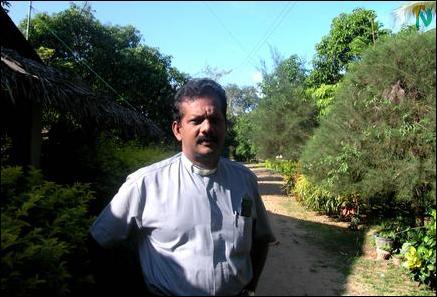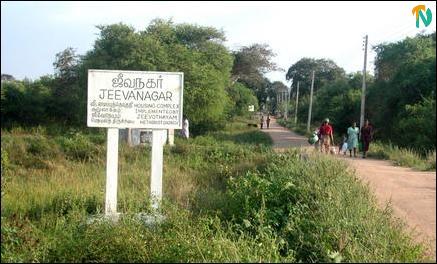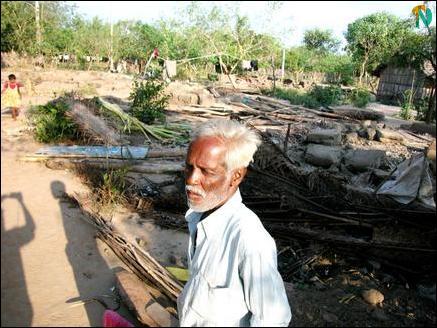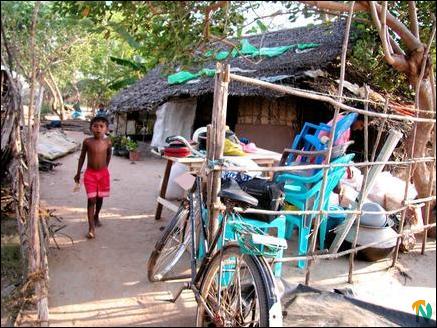
Church farm helps dispossessed, poor
[TamilNet, Sunday, 20 April 2003, 03:30 GMT]
The Methodist Church’s Jeevothayam Farm in Pariyaarikkandal, 28 kilometres southeast of Mannar town, has been a refuge for the dispossessed and the meek for more than quarter of a century. Tamils driven out of their homes in the island’s tea producing hills by Sinhala Buddhist nationalists in 1977, 81 and 83 found succour here before they went forth to settle and multiply in the inhospitable jungles of the Vanni.
 |
|
memorial for Fr. Jeyarajasingham in the farm
|
“The Christian Church’s first martyr in the Tamil people’s struggle for justice was the former superintendent of Jeevothayam, Rev. George Jeyarajasingham. He was murdered for daring to speak out against the first mass massacre of innocents in Mannar in 1984. It continues to be our mission to stand up and speak out for the downtrodden children of God. Nothing will detract us from this purpose”, says Rev. Rueben Ariyanayagam, the present incumbent of the farm who is also superintendent of the region’s Methodist parishes.
The Sri Lanka army massacred 178 civilians along the Mannar road in Uyilankulam in December 1984 in retaliation to an ambush by the Liberation Tigers in the area.
Rev. Jeyarajasingham vowed to expose the mass murder.
 |
|
a refugee child pumping water in Jeevanagar
|
According to his colleagues, he wrote to the Amnesty International and UN bodies. They said the priest was planning to travel abroad, armed with the facts of the massacre, to seek justice and bring the perpetrators to book by addressing human rights forums there.
Soldiers, allegedly from the SLA’s Thallaadi camp stopped his vehicle while he was returning to the farm from Mannar on 13 December 1984, shot him dead at point blank range along with two other persons in the vehicle and set fire to it.
A Catholic priest, Rev. Bastian of Vankalai, who was also making an effort to bring the massacre to light, was murdered too, allegedly by the SLA.
The Sri Lankan government at the time conducted no investigations.
Both Rev. Jeyarajasingham was from Batticaloa. So too is Fr. Reuben.
 Fr. Reuben in front of his office in the farm
Fr. Reuben in front of his office in the farm
The lush sixty acre farm is situated by a scenic bend of the Aruviyaaru, one of the main rivers which are fed by the numerous streams of the Vanni. Jeevothayam was established in 1973.
About 75 displaced families live on the farm. Hundreds live in the wattle and daub refugee shelters of Jeevanagar – a housing scheme, which was, according to Rev. Reuben, “built by the Church for the poorest of the poor”.
Forty nine houses, a library and community were constructed by the Methodist Church in a land on the approach to the farm in 1983.
Thousands of families were uprooted from their villages in early 1997 as the Sri Lanka army moved on the main trunk road to Mannar, backed by heavy artillery bombardment which flattened several buildings in the region, including the Murunkan railway station. More families were driven out from their homes in the northern parts of the Mannar mainland when the SLA launched the Rana Gosha (Battle Cry) series of operation to secure Vanni’s western sector in early 1998.
Thousands were driven out of refugee shelters along the Mannar road and Madhu area.

The Jeevothayam Farm helped the region weather the calamity by co-ordinating efforts to establish welfare centres in Jeevanagar to shelter part of the populations driven out by the SLA operations.
Several families built wattle and daub homes in Jeevanagar, expecting the war to be long. Many have started to go back to their villages recently – particularly in areas recaptured from the SLA by the Tigers and de-mined by them. Others are yet stuck in the welfare centre because their homes are occupied by the military.
“Thirty one families fled Parappaankandal in 1991 when the army moved there. We lived as refugees in Madhu until 1998. We had to leave the camp that year and found a place to live in Jeevanagar. The army has now left our village. But nothing remains of my home there. No one has given us money to rebuild houses. Therefore were are dismantling our cottages here and are taking whatever we can to make our homes”, said Anthony Saverian Cruz, 64, who was preparing last week to go back to his village and start life anew. The SLA has vacated a Catholic convent it was occupying in his area. Hence Cruz’s village too was freed.
He told Tamilnet he was a farmer before he was driven out of Parappaankandal by the army. Later in the refugee camps he had to eke out a living as a coolie, according to Cruz.
 Mr. Cruz; demolished refugee homes in the background
Mr. Cruz; demolished refugee homes in the backgroundBut other refugees at Jeevanagar are not so fortunate. Families from Poomalarnthaan, Thambanaikulam, Ahaththi Murippu and Kattaiadampan along the Mannar road are still unable to return because their villages are infested with land mines and unexploded ordnance left behind by the SLA.
Jeevothayam was one of the few places in the north that withstood the ravages of war, a singular sanctuary for the dispossessed who had few places to go with their suffering families. But the life was not easy for the farm administration either. It had to face many restrictions as it was situated in an area that not under the direct control of the Sri Lanka army.
The farm runs a boys’ home and a day care centre for children. There are 52 children in this home. There are orphans, children of single parents and war affected families.
Fr. Rueben has organised several farmers’ and women’s organisations in the area. He was in the forefront of the recent agitations by Mannar farmers to secure fair prices for rice.
“Last August we took the first batch of farmers to visit the Mahaillupallama government farm in twenty years. They were able to learn modern agricultural practices, techniques and machinery”, the priest said.
 a refugee familiy packing up to leave Jeevanagar
a refugee familiy packing up to leave JeevanagarStudents sitting for the O. L and Grade 5 scholarship exams are assisted by the farm’s administration.
Jeevothayam also conducts vocational training. Masonry, motorbike, cycle and water pump repair and tractor maintenance are taught here. “Sixty percent of the women who are attending our masonry classes are women,” says Rev. Reuben.
“But remember what we are doing for the people of this region is just a drop in the ocean. Others also should volunteer to do more for these people, especially because they are most likely to be forgotten in the larger scheme of things”, cautions the priest.














